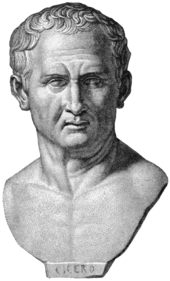Ipse dixit

Ipse dixit, etiam fallacia adfirmationis nudae appellatum, est vocabulum quod adhibetur ad agnoscendum et describendum genus dictionis arbitrariae et dogmaticae quod is qui dicit exspectat auscultatorem firmum recipere.[1][2] Ipse dixit negat talem rem disputari posse: "prorsus, sic tantumst."[3] Fallacia in qua propositum ut fait accompli ("Sic tantumst"[4]) per adfirmationem nudam defenditur argumentum omnino per reiectionem distorquet: "Primus modus rei distortae est negare quod ea exsistit."[4]
Historia
[recensere | fontem recensere]Latina locutionis forma a Cicerone (106–43 a.C.n.) oratore et philosopho Romano in De Natura Deorum libro investigationum theologicarum deducitur, quae est eius forma locutionis Graecae eiusdem significationis, αὐτὸς ἔφα, argumentum ex auctoritate a discipulis Pythagorae factum cum dicta domini, non causas vel indicia, appellarent.[5][6] Unde ante saeculum septimum decimum ineuns, eruditi nomen ipse dixit adhibere solebant ut sua argumenta excusarent si argumenta antea ab Aristotele philosopho Graeco antiquo (384–322 a.C.n.) adhibita erant[7]: "Ante tempus Francisci Bacon, discipuli Aristotelem accipere solebant ducem, qui errare non potuit, et cum disputatio oriretur, non factum sed theoriam Aristotelis appellabant, et phrasis ipse dixit omnem disputationem finivit."[8]
Ipsedixitismus
[recensere | fontem recensere]Ieremias Bentham saeculo duodeviginti exeunte locutionem ipse dixit in nomen substantivum ipse-dixitismum commutavit.[9] Bentham hoc vocabulum fecit ut id omnibus argumentis politicis non utilitarianis adhiberi posset.[10]
Usus legitimus hodiernus
[recensere | fontem recensere]Locutio ipse dixit in hodiernis diiudicationibus legitimis et administrativis adhibita est, plerumque ad reprehenda argumenta solum apud auctoritatem cuiusdam organizationis condita. Anno 1997, Iudicium Maximum Civitatum Foederatarum quaestionem agnovit "indicia opinabilia, quae cum datis exstantibus coniungitur solum per ipse dixit scientis."[11][12]
Nexus interni
Notae
[recensere | fontem recensere]- ↑ William Dwight Whitney, "Ipse dixit," The Century dictionary and cyclopedia (1906), 379-380.
- ↑ Robert B. Westbrook, "John Dewey and American Democracy," p. 359.
- ↑ Sebranek, Patrick et al. (2011). Write 1, p. 173.
- ↑ 4.0 4.1 VanderMey, Randall et al. (2011). Comp, p. 183: "Bare assertion. The most basic way to distort an issue is to deny that it exists. This fallacy claims, 'That's just how it is.'"
- ↑ Angelus Politianus,Angelo Poliziano's Lamia: Text, Translation, and Introductory Studies, (2010), p. 26. Locus: "In Cicero's De natura deorum, as well as in other sources, the phrase “Ipse dixit” pointed to the notion that Pythagoras's disciples would use that short phrase as justification for adopting a position: if the master had said it, it was enough for them and there was no need to argue further."
- ↑ Jeremy Bentham, Works of Jeremy Bentham (1838), vol. 1, pars 2, p. 467. Locus: "Ipse dixit is an expression that took its rise from . . . the disciples of Pythagoras"
- ↑ George Ward Burton, Burton's book on California and its sunlit skies of glory, 1909:27.
- ↑ Anglice: "By the time of Bacon, students had fallen into the habit of accepting Aristotle as an infallible guide, and when a dispute arose the appeal was not to fact, but to Aristotle's theory, and the phrase, "Ipse dixit," ended all dispute."
- ↑ Jeremy Bentham (1834), Deontology; or, The science of morality, vol. 1, p. 323; locus: "ipsedixitism . . . comes down to us from an antique and high authority,—it is the principle recognised (so Cicero informs us) by the disciples of Pythagoras. Ipse (he, the master, Pythagoras), ipse dixit,—he has said it; the master has said that it is so; therefore, say the disciples of the illustrious sage, therefore so it is."
- ↑ Jeremy Bentham (1838), Works of Jeremy Bentham, p. 192. Locus: "it is not a mere ipse dixit that will warrant us to give credit for utility to institutions, in which not the least trace of utility is discernible."
- ↑ Anglice: "opinion evidence which is connected to existing data only by the ipse dixit of an expert."
- ↑ Filan, citans General Electric Co. v. Joiner, 522 U.S. 136, 137; 118 S.Ct. 512; 139 L.Ed.2d 508 (1997).
Nexus externi
[recensere | fontem recensere]| Vide Ipse dixit in Victionario. |
- Ipse dixit at nolo.com
- Ipse dixit, dictionary.reference.com
- Ipse dixit, www.bartleby.com